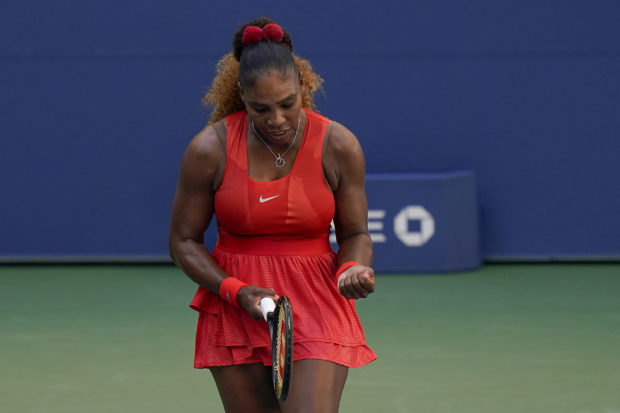
Serena Williams, of the United States, reacts during a match against Sloane Stephens, of the United States, during the third round of the US Open tennis championships, Saturday, Sept. 5, 2020, in New York. (AP Photo/Seth Wenig)
NEW YORK — In danger of her earliest exit at the U.S. Open since her debut 22 years ago, Serena Williams turned things around and took over against Sloane Stephens.
Williams emerged from the third-round matchup between two Americans who are past champions at Flushing Meadows — she’s won six of her 23 Grand Slam singles titles at the place — with a 2-6, 6-2, 6-2 victory over 2017 titlist Stephens on Saturday.
Afterward, Williams’ 3-year-old daughter, Olympia, wore a mask and waved at Mom while sitting on her father’s lap in a front-row seat. On her way to the locker room, Williams waved back.
“I hope,” Williams said, “that she saw her mama fighting.”
Williams did it, as she so often does, with her best-in-the-game serve, hitting 12 aces at up to 122 mph as it got really dialed in midway through the second set, and an ability to re-calibrate her groundstrokes that were so awry early and so superb down the stretch.
“She served a lot better,” said Stephens, now 1-6 against Williams, although they hadn’t played each other since 2015. “Obviously she has one of the greatest serves in the game. It’s really difficult to read.”
Williams collected 10 of the last 12 games by lifting her level, to be sure. But it helped that Stephens went from playing nearly perfectly to missing more and more. Following mistakes, Stephens would look over at her coach, Kamau Murray, or smack her right thigh with her palm so loudly that it echoed through a nearly empty Arthur Ashe Stadium.
“In that first set, I don’t think she made any errors, honestly. She was playing so clean. I said, ‘I don’t want to lose in straight sets,'” said Williams, whose only career U.S. Open loss before the fourth round came in the third against Irina Spirlea in 1998 at age 16.
Williams, who turns 39 in three weeks, said she told herself Saturday: “OK, Serena, just get a game. Get a game.”
There were, of course, no fans — banned because of the coronavirus pandemic — and so the whole thing was flush with the feel of a practice session, rather than a high-stakes contest on a Grand Slam stage.
There were some other players on hand to watch, including 15th-seeded Maria Sakkari, who sipped orange juice and ate lunch while on her player suite’s balcony. Sakkari had a vested interest: She faces Williams for a berth in the quarterfinals.
Other women into the fourth round: No. 16 Elise Mertens, No. 20 Karolina Muchova and Tsvetana Pironkova, who defeated No. 18 Donna Vekic 6-4, 6-1.
In men’s action, 2019 runner-up Daniil Medvedev and another semifinalist from a year ago, No. 6 Matteo Berrettini moved on, as did No. 10 Andrey Rublev, No. 15 Felix Auger-Aliassime, No. 21 Alex de Minaur and Vasek Pospisil, who’s been in the news lately because he teamed up with Novak Djokovic to set up a new association to represent players.
Pospisil eliminated No. 8 Roberto Bautista Agut 7-5, 2-6, 4-6, 6-3, 6-2, and next faced another five-set winner, de Minaur, who defeated No. 11 Karen Khachanov 6-4, 0-6, 4-6, 6-3, 6-1.
Williams vs. Sakkari is a rematch of their meeting won last month by Sakkari at the Western & Southern Open, a hard-court tournament played at the U.S. Open site instead of its usual home in Ohio because of the pandemic.
“You know, Serena is Serena,” Sakkari said after advancing earlier Saturday by beating 19-year-old American Amanda Anisimova 6-3, 6-1. “You have to come up with some great tennis. Otherwise there is no chance against her.”
Stephens did that very thing in the early stages Saturday.
She was playing patient, wait-for-the-right-moment tennis, creating lengthy, complicated points that more often than not ended with Williams blinking first.
The end of the first set was met by total silence — not even the awkward, manufactured soundtrack piped in during other matches to simulate ambient noise.
From 2-all in the second, Williams finally made inroads. She saved a break point, then broke for the first time when Stephens missed a forehand, part of a stretch in which Williams grabbed 12 of 15 points.
She was on her way. And now she is four wins from adding to her Grand Slam trophy count, which has been at 23 since she won the 2017 Australian Open while pregnant.
Asked Saturday what the positives are about still being active on tour as a parent, Williams said: “One day, your daughter can say she was there. Whether she remembers or not, we can always have pictures. But other than that, it’s just (a) minus, like: I’m not with her, I’m not around her. It’s hard.”
Williams has reached the finals at four of the past seven major tournaments, losing each time.
“We all hope she gets to it,” Stephens said. “If she is feeling pressure, I hope she releases it and gets to 24.”

